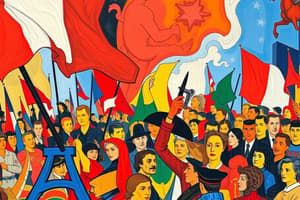Podcast
Questions and Answers
What were the two main religious groups involved in the conflict in Northern Ireland?
What were the two main religious groups involved in the conflict in Northern Ireland?
- Anglicans and Nonconformists
- Catholics and Protestants (correct)
- Methodists and Baptists
- Lutherans and Orthodox
Which agreement aimed to resolve the conflict in Northern Ireland?
Which agreement aimed to resolve the conflict in Northern Ireland?
- Belfast Agreement (correct)
- Camp David Accords
- Treaty of Versailles
- Paris Peace Accords
What key economic factor impacted various groups in Canada?
What key economic factor impacted various groups in Canada?
- Unemployment rates
- Import/export tariffs
- Fluctuating oil prices (correct)
- Real estate markets
What was the primary cause of the Winnipeg General Strike in 1919?
What was the primary cause of the Winnipeg General Strike in 1919?
Which program was contentious regarding Canadian oil resources?
Which program was contentious regarding Canadian oil resources?
What was one of the key themes discussed in relation to nationalist loyalties?
What was one of the key themes discussed in relation to nationalist loyalties?
How did religious conflicts in Ireland primarily manifest?
How did religious conflicts in Ireland primarily manifest?
Which aspect of economic impacts was highlighted in the analysis?
Which aspect of economic impacts was highlighted in the analysis?
Flashcards
Religious Conflicts in Ireland
Religious Conflicts in Ireland
The conflict between Catholics and Protestants in Ireland, particularly in Northern Ireland, which led to violence and political division.
Nationalist Loyalties
Nationalist Loyalties
Allegiances to different nations, which can cause tension and unrest when groups have conflicting loyalties.
Economic Impacts on Conflicts
Economic Impacts on Conflicts
Economic factors, such as inflation, energy costs, and fluctuating oil prices, can affect and influence different regions and social groups.
Winnipeg General Strike
Winnipeg General Strike
Signup and view all the flashcards
Belfast Agreement
Belfast Agreement
Signup and view all the flashcards
National Energy Program (NEP)
National Energy Program (NEP)
Signup and view all the flashcards
Alberta's Role in Oil Production
Alberta's Role in Oil Production
Signup and view all the flashcards
Economic Disparities in Canada
Economic Disparities in Canada
Signup and view all the flashcards
Study Notes
Nationalist Loyalties Competition
- Dispute of equality in society, based on wealth, status and education
- Winnipeg General Strike in 1919, labor unions lacked power after WWI
- Thousands of workers (railway, factory, postal, cooks, waiters, telephone operators, firefighters, and police) walked off the job
- 2 people killed, 30 injured, and strike leaders arrested
Religious and Nationalist Loyalties
- Conflict between Catholics (Irish) and Protestants (British in Ireland)
- 1922, 26 southern Irish counties became an independent republic and predominantly Catholic.
- 6 northern Irish counties remained with Britain, and were Protestant.
- Trouble continued in Northern Ireland in the 1970s, with paramilitary groups (IRA and Loyalists)
- Belfast Agreement (Good Friday Agreement), a 1990 settlement to end fighting, the long-term peace remains uncertain
Regional and National Loyalties
- 1970s inflationary period, prices rise, and money buys less
- War between Israel and Middle Eastern countries, resulting shortages
- Canadian manufacturers in Ontario and Quebec faced high energy costs, many people lost their jobs
- Alberta's oil prices were high, bringing higher profits and tax revenues for the province
- PM Pierre Trudeau froze prices of Canadian-produced oil and gas, and began taxing Western Canada's oil.
- National Energy Program (NEP) aimed to protect Canadians from rising oil prices and to increase Canadian ownership in the oil industry.
- This led to the creation of Petro-Canada (a crown corporation)
- Alberta's premier (Peter Lougheed) resisted, leading to an agreement in 1981. Alberta gained more control over oil prices and revenues.
Studying That Suits You
Use AI to generate personalized quizzes and flashcards to suit your learning preferences.




